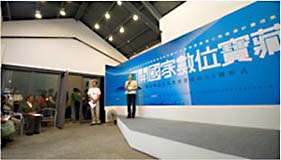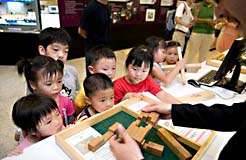Digital Archives Request-for-Proposals Project
The Taiwan Digital Archives Expansion Project is one of the eight major Division Projects of the Taiwan e-Learning and Digital Archives Program (TELDAP). The goal of the Taiwan Digital Archives Expansion Project is to establish digital archival contents presenting the diversity of Taiwan’s culture, society, and natural environment. The Digital Archives Request-for-Proposals Project is the second subsidiary project of the Taiwan Digital Archives Expansion Project.
The goal of this project is attempting to expand the scope of participants involved in the digitization process. We hope to see an increasing number of archival institutes, public and private institutions as well as the general public participate actively in the establishment of Taiwan’s digital archives. Through Digital Archives Request-for-Proposals Project and the Cyber Island platform for digital archiving, we hope to stimulate the participation of each sector of society in the digitization project. By holding various types of meetings, workshops, and other events, we hope to promote the knowledge value of the digital archives, increase the digitized collections, and reduce the digital gap in Taiwan.
In order to establish a more comprehensive digitized collection representative of the diversity of Taiwan’s culture, society, and natural environment, Digital Archives Request-for-Proposals Project is carrying out the plan delineated by the National Science Council and is openly recruiting participants to establish digital contents. We hope that those who are capable and interested will join our digitization efforts and share their experiences with us.
Digital Archives Applications and Promotions Request-for-Proposals Project
Taiwan’s digital archives initiatives have amassed a substantial amount of archive resources, and the efficient application of these contents in the education, academic research or industrial sectors has become an important issue. The Academic and Social Promotions and Applications of Digital Archives and e-Learning Project (ASPA), a Division Project of TELDAP, has the goal of integrating the content and technology of digital archives into the educational, research, industrial and social sectors, and building upon the foundations laid in the project’s first stage to expand and enhance the application of digital archives in the cultural, academic, and industrial fields, and to advance the development of a digital society. In practice, ASPA will work from the angles of culture, academia, socio-economics and education. It will focus on the following four main areas:
- Development of Licensing Platform and Regulation Mechanism: From the legal and economic perspective, we will address intellectual property rights and licensing issues of digital archives, plan and evaluate a licensing platform, establish a standardization mechanism, and draft regulatory policies.
- Academic Application and Cultural Diffusion: From the academic and cultural perspective some of the digital archives can be regarded as public assets. With respect to academic application and dissemination of culture, we will promote access to and dissemination of digital archives from the angle of the user.
- Cultural and Social Development: From the cultural and social perspective, we will emphasize bridging of the digital divide between urban and rural areas, promote ethical use of information and digital human rights, and improve the user interface and social influences.
- Geographical Information Application and Promotion: From the academic and educational perspective, we will create GIS data exchange platforms, promote academic and educational applications of GIS in digital archives and develop educational material and resources to support teaching of related courses.
The Digital Archives Applications and Promotions Request-for-Proposals Project is designed to assist ASPA through requesting proposals. Based on the core missions, participants with diverse viewpoints will be openly sought so that more digital archive promotion and application resources can be integrated, promoting the use of digital archive contents and technology in education, research, industry and society at large.


Digital Archives Application and Promotion Project Annual Exhibition 2007
Technology Research and Development Request-for-Proposals Project
The establishment of digital archives involves many information technology (IT) related issues, including use interface, communications network, natural language processing, information compression, information security certification and integrated services. To coordinate the IT requirements of archive institutions, TELDAP has developed the Research and Development of Digital Archives and e-Learning Technologies Project which develops forward-looking, key or innovative IT to improve the production and management of digital collections. It also makes utilization more flexible and convenient and maintains cutting-edge research on related information technologies. Digital archive-related technology research is very large in scale and some key components or technologies cannot be included in this project because of manpower limitations. Thus it is hoped that the Technology Research and Development Request-for-Proposals Project will encourage participation of researchers from different research institutes to enhance the research and development of advanced digital archives technology. Also, for quality control, approval of these projects will depend on the previous experience and achievements of applicants.
Outstanding e-Learning Research Center/Group Project
In order to improve e-learning research and advance the development of e-learning related industries, under the Research and Development of Digital Archive and e-Learning Technologies Project, the Outstanding e-Learning Research Center/Group Project carries out research using an integrated inter-disciplinary method which leads to further research and development of e-learning and integrates social resources. Active cooperation with outside circles will help realize the objective for educational application and industrial development. Outstanding e-Learning Research Centers/Groups are expected to be inter-disciplinary and even inter-university organizations. With this project as a platform, universities and research institutions can integrate relevant talent and the resources of related projects for long-term interdisciplinary research.
The rational behind setting up Outstanding e-Learning Research Centers/Groups is to expand the scale of original research and establish long-term goals and guidelines for the development of the project. Integration with the resources of other units, such as universities, the Ministry of Education or other government agencies, and industries, is clearly important in promoting synergy in the operation of the overall plan.
Chinese as a Second Language (CSL) e-Learning Project
In the interest of advancing research in e-learning Chinese as a second language, and promoting the commercial development of Chinese e-learning under the e-Learning for Chinese Language Project, proposals for Chinese as a Second Language (CSL) e-Learning Project are requested.
Over the past 50 years, Taiwan has laid the foundation for teaching Chinese as a foreign language, and has accumulated a lot of Chinese language teaching materials while producing a large number of experienced Chinese language teachers. The requested contents include Chinese words and phrases, designs for phonetic teaching, course development, examination and evaluation, and Chinese linguistic psychology research. The goal is to promote interaction between academic organizations and Chinese language-related industries and encourage the production of quality Chinese language products based on sound research, making Taiwan a research center for Chinese language learning and teaching.
The proposals requested are mainly related to research into the process of e-learning Chinese as a second language and the development of foreign-oriented Chinese e-learning modules. By leveraging Taiwan’s advanced IT industry and the existing e-learning network, and by combining technology, human resources, creativity and cultural digital archives and digital teaching materials, Chinese language learning research domain will be established, and high quality study materials and teaching services will then be provided to students all over the world.